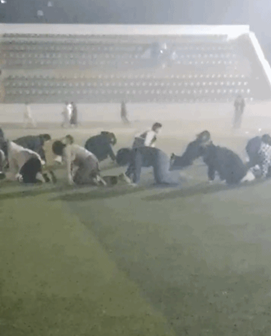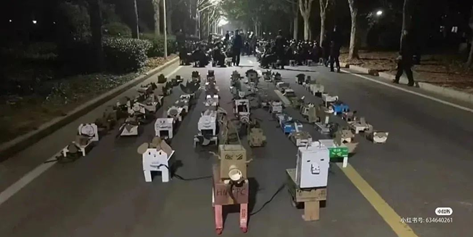OPINION: China’s brightest young minds have been doing something recently that challenges conventional wisdom: crawling.
Yes, crawling. On all fours. And it’s not an isolated incident of one individual going cuckoo. It is an organised event contagiously spreading across multiple renowned institutions, including China’s world-class Tsinghua University (pictured above). In the unsettling videos reminiscent of cult rituals in horror movies, young students are seen crawling one after another in circles, or shoulder to shoulder, on the artificial turf lit by floodlights at night.

Crawling on a university sports field | Image: Supplied
Crawling is preceded by another mind-boggling hobby that was trendy among China’s tertiary students not long ago: keeping dogs made of cardboard boxes. Pictures circulating online show many walk their “dogs” on campus, talk to them, and show them off in beauty pageants.
The easy explanation for the baffling phenomena is that these young people are losing their minds. And it is a plausible theory. China’s once successful zero-Covid policy, now challenged by the highly transmissible Omicron, has placed around 280 million people from more than 150 cities under draconian lockdowns since March, causing significant economic and mental health tolls and even sparking sporadic unrests.
University life under lockdown is no fun. These energetic young adults, who typically live in dorms of four to eight, often find themselves cooped up in a small, crowded space, staring at the screen most of the day to attend lectures delivered online. Under “silent management” - a novel piece of officialese invented to replace the traumatising “lockdown” - courier, takeaway, haircuts, grocery trips, sports, dinner rendezvous with friends, dates, and many other ordinary activities we tend to take for granted - are either prohibited, or become discretionary at the whim of others endowed with mysterious power in legally specious states of emergency. A freshman’s question “were university students pre-Covid allowed to leave campus as they pleased?” was met with both derision and sighs online, reminding many of how distant in the past the normal life is. Even more troubling is the lack of certainty for the future: China has yet to provide a clear roadmap on how and when it will gradually abandon zero-Covid policy and open up. Against this background, it does not seem unreasonable to question the mental state of the young crawlers and “dog” owners.

Cardboard "dogs" go for a walk | Photo: Supplied
Yet the Chinese authorities apparently do not intend to jump to such an easy conclusion. Leaked screenshots of messages from university officials indicate students were warned not to participate in such activities allegedly led by foreign powers with political agenda; a photo shows officials working overtime at night, blocking the sports field entrance and forcing students to cancel their crawling plans; in a video, an official demonstrates his genuine commitment to pastoral care, walking closely alongside a lonely crawler in darkness. Facing ridicule online for their overreaction, some universities urgently clarified that they never intended to ban legal activities such as crawling.
Although having no good reason to ban crawling, the Chinese authorities are certainly not going to let it remain inexplicable. Many state-owned media outlets suddenly began to post on social media highly similar content of “experts” commenting on the health benefits of crawling and giving advice on how to “correctly” crawl to avoid injuries. What a revelation! So it turned out that the young people were just exercising. Reason is thus restored.
In the face of the series of bizarre incidents, two questions are worth asking. Why do these elite students engage in absurd activities? And why are the Chinese authorities so anxious to find meaning from absurdity?
As I was writing this, I walked out to the deck and wanted to see the stars. The rain had stopped not long ago but the lustreless sky was still cloudy. I noticed the chirping of crickets and moist breeze on my face, and remembered how November in Beijing was always cold, dry and windy. I took a deep breath and walked back.
No rational calculation could ever predict these actions of mine. They are purely spontaneous. In the sense of beginning something anew by myself, I am free. To quote the words of Hannah Arendt, the famed philosopher who wrote extensively on totalitarianism, “the fact that man is capable of action means the unexpected can be expected from him, that he is able to perform what is infinitely improbable.” It is these spontaneous actions arising from our unique inclinations, values and background that constitute our individuality, making life as a human being worth living.

Picture of Arendt | Licensed under creative commons
Now consider life under strict lockdown, in the absolute “silent mode”. It is life stripped down to the bare minimum, where only the most essential, life-sustaining activities are considered necessary and allowed. Visiting sick grandma? Playing a ball game? Picnic in the sun? A cup of coffee? Taking a walk in the park? Hair growing too messy and wanting a trim? Certainly one can do without these non-essential activities? Insignificant personal sacrifices serve the common good, you’ll be told. What is not said explicitly, but is coming to be realised by many, is that the power that undertakes to assess the necessity of each daily activity also compresses the room for individual spontaneity in the meantime.
In this context, to continue to act spontaneously is to defy that power. Crawling is therefore a genius move. It is a natural bodily action that is indeed mostly unnecessary. Its occurrence is therefore unexpected, and even more so is its popularity. Analogous to performance art, crawling invites thinking. Its absurdity, and the even more absurd and uninvited participation from the authorities by suppressing it, lead the audience to question on what legitimate grounds can the government dictate what ordinary activity is essential and what is unnecessary.
Now it is easy to understand why the authorities are so eager to define the absurd. Actions lose their spontaneity and thought-provoking quality, when they can be rationally understood as if they are the next step in a carefully thought-out plan. People simply don’t think about the political implications of physical exercise.
Discussion around crawling as health exercise will be safely confined to its effectiveness, while discussion around crawling as absurd spontaneous action leads one to ask one undesired “why” after another, venturing into a space of infinite possibility.
And that space is too vast and unknowable, for people who dream of getting everything under control. It’d better not exist.
- Asia Media Centre
Opinions expressed in this article are the views of the author.
